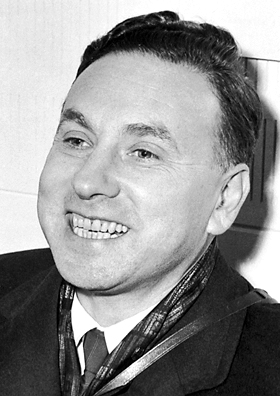Robert Hofstadter
Robert Hofstadter (February 5, 1915 – November 17, 1990) was an American physicist who was awarded the Nobel Prize in Physics in 1961 for his pioneering work in the field of electron scattering in atomic nuclei and for his discoveries concerning the structure of nucleons. His research significantly advanced the understanding of the atomic nucleus and the subatomic particles.
Early Life and Education[edit | edit source]
Robert Hofstadter was born in New York City, New York. He attended Princeton University, where he earned his B.A. in 1935 and his Ph.D. in 1938. His doctoral thesis focused on the photoelectric effect in cesium and potassium.
Career and Research[edit | edit source]
After completing his Ph.D., Hofstadter worked at the National Bureau of Standards and later joined the faculty at Princeton University. During World War II, he contributed to the development of radar technology.
In 1950, Hofstadter joined the faculty at Stanford University, where he conducted his Nobel Prize-winning research. He used high-energy electron scattering to probe the internal structure of protons and neutrons, revealing that these particles have a finite size and an internal structure. This work provided crucial insights into the strong nuclear force and the quark model of particle physics.
Nobel Prize[edit | edit source]
Hofstadter was awarded the Nobel Prize in Physics in 1961, sharing the honor with Rudolf Mössbauer, who was recognized for his work on the Mössbauer effect. Hofstadter's Nobel lecture focused on the structure of the nucleon and the implications of his findings for the field of nuclear physics.
Later Life and Legacy[edit | edit source]
Hofstadter continued his research at Stanford until his retirement in 1985. He was also involved in the development of scintillation counters and other instruments used in particle physics experiments. His contributions to the field have had a lasting impact on the study of subatomic particles and the fundamental forces of nature.
Robert Hofstadter passed away on November 17, 1990, in Stanford, California. His legacy lives on through his groundbreaking research and the many students and colleagues he mentored throughout his career.
Personal Life[edit | edit source]
Hofstadter was married to Nancy Givan, and they had three children, including Douglas Hofstadter, a noted cognitive scientist and Pulitzer Prize-winning author.
See Also[edit | edit source]
References[edit | edit source]
External Links[edit | edit source]
Template:Nobel Prize in Physics Laureates 1961
Search WikiMD
Ad.Tired of being Overweight? Try W8MD's physician weight loss program.
Semaglutide (Ozempic / Wegovy and Tirzepatide (Mounjaro / Zepbound) available.
Advertise on WikiMD
|
WikiMD's Wellness Encyclopedia |
| Let Food Be Thy Medicine Medicine Thy Food - Hippocrates |
Translate this page: - East Asian
中文,
日本,
한국어,
South Asian
हिन्दी,
தமிழ்,
తెలుగు,
Urdu,
ಕನ್ನಡ,
Southeast Asian
Indonesian,
Vietnamese,
Thai,
မြန်မာဘာသာ,
বাংলা
European
español,
Deutsch,
français,
Greek,
português do Brasil,
polski,
română,
русский,
Nederlands,
norsk,
svenska,
suomi,
Italian
Middle Eastern & African
عربى,
Turkish,
Persian,
Hebrew,
Afrikaans,
isiZulu,
Kiswahili,
Other
Bulgarian,
Hungarian,
Czech,
Swedish,
മലയാളം,
मराठी,
ਪੰਜਾਬੀ,
ગુજરાતી,
Portuguese,
Ukrainian
Medical Disclaimer: WikiMD is not a substitute for professional medical advice. The information on WikiMD is provided as an information resource only, may be incorrect, outdated or misleading, and is not to be used or relied on for any diagnostic or treatment purposes. Please consult your health care provider before making any healthcare decisions or for guidance about a specific medical condition. WikiMD expressly disclaims responsibility, and shall have no liability, for any damages, loss, injury, or liability whatsoever suffered as a result of your reliance on the information contained in this site. By visiting this site you agree to the foregoing terms and conditions, which may from time to time be changed or supplemented by WikiMD. If you do not agree to the foregoing terms and conditions, you should not enter or use this site. See full disclaimer.
Credits:Most images are courtesy of Wikimedia commons, and templates, categories Wikipedia, licensed under CC BY SA or similar.
Contributors: Prab R. Tumpati, MD

